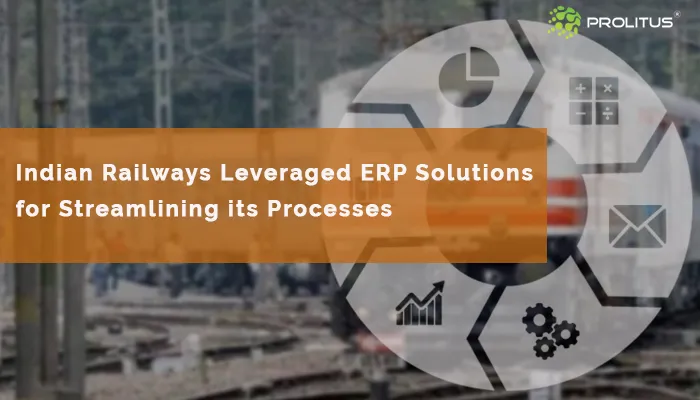Indian Railways, the world’s fourth largest network of railways, runs around 11,000 trains every day of which 7,000 are passenger trains transporting nearly 13 million passengers, as per a 2015 source. Invariably, it is important that railway assets are maintained to ensure that it runs as per schedule. So, whether it is the addition of new coaches, or repair of tracks, procurement and maintenance of material is an important functionality that takes up an estimated 20 percent of the entire Railway Budget costs. Apart from this, supply chain management is also integral to the processes.

the Indian Railways Leveraged ERP Solutions
Some of the major roadblocks that the Indian Railways faces are evident in the supply chain and the procurement processing. Vendor mismanagement, huge infrastructural costs, lack of transparency, lack of inventory control, wastage, corruption and red tapism are evident. The Railways also suffers from needless delays as any work that could be accomplished in weeks takes years because of the lack of transparency, duplication of efforts, all of which could have been avoided if all were on the same page.
What is ERP?
Enterprise Resource Planning (ERP) is a software solution that is increasingly adopted by companies to reduce business costs, as well as duplication of work. But the real benefits are in terms of the access and visibility it affords users anywhere and anytime via the cloud while provide real-time reporting. The modernization, rather the digitization of Indian Railways through cloud enhanced technologies is just one example of how ERP is fast bridging the divide in the real-time world and unifying businesses. Big or small businesses have benefitted immensely with the adoption and incorporation of ERP. Apart from the procurement, integrated ERP is exceedingly essential for sales as it helps in improving productivity.
ERP solutions- A Game Changer
Considering the immense scope of work required in running the railway network on a day-to-day basis, without a glitch, the Indian Railways has systematically moved its processes towards an Enterprise Resource Planning (ERP) for ease of operations. In 2007, the Indian Railways integrated its freight and passenger and administrative operations under an ERP software. Last year, the Railway minister announced that Indian Railways would be working on a project for incorporating an ERP solution for sales and procurement. Specifically, in the e-tendering process, every tender will have to go through the electronic channel only. With such a move, the railways are expected to become more transparent and efficient. This would not only facilitate the participation of every stakeholder in the procurement process but would also ensure that all remain on the same page.
The second benefit that is expected to arise is in the supply chain, which is cumbersome and difficult to manage. With the digitization of the supply chain, many of the impediments such as lack of inventory and quality control, corruption, etc., that currently assails the processes involved in supply chain management could be rectified.
Here’s how ERP solutions for sales can benefit businesses:
Provides competitive and strategic pricing: ERP helps businesses to provide competitive pricing of their products. It helps in identifying unique customer situations and regulating the price of goods accordingly, without affecting their competitive edge.
Helps sales personnel of large enterprises retain crucial information about the product and the market through timely updates. They are also able to analyse competitor information.
Real time identification of activities and rolling stock: By incorporating ERP software, businesses could gather updates regarding changing market trends such as price change, sudden requirement of goods, etc.
Building relationships: A robust system with integrated CRM and ERP can help build relationships with existing customers. Since, ERP provides access to customer choices and preferences, including modes of delivery of goods, payment terms and channels of marketing, it helps building relationships at a more personalized level.
Need for Choosing the best ERP:
Today, several companies offer specific ERP software solution for businesses across different industry verticals. As a result, ERP consulting before hosting a service is essential as not every software solution can turn out to be profitable. While choosing an ERP software, it is worthwhile to consider the costs, ease of integration with existing solutions, scalability and more.









